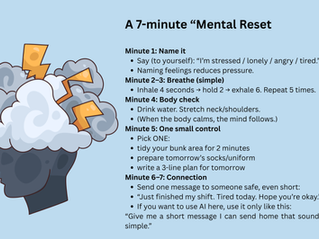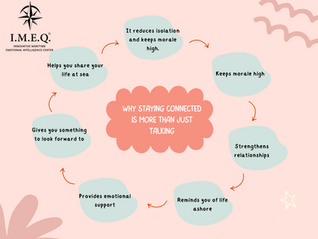Psychological stress & mental health in seafarers
- Jan 16, 2023
- 3 min read
Updated: Sep 12, 2023
Seafaring is a challenging profession. Seafarers are exposed to quite a few risk factors, all of which may lead to serious and psychological impairments. Isolation and loneliness, lack of shore leave, fear of criminalization, fear of job loss and separation from family all predispose seafarers to depression as well as other mental illnesses are all important factors that contribute to poor mental health.
Seafaring is characterized by a unique set of features, which makes it different compared to other occupations in similar fields or similar positions. Demanding physical working conditions, potentially hazardous tasks, long hours of work and high levels of stress and fatigue, are all part of the job description. Seafarers also have to deal with a “lonely lifestyle”. They spend most of their time away from family and friends.
But more than that, while onboard they still live isolated lives. Crew members come from different cultural and ethnic backgrounds, which may make it challenging for individuals to connect with fellow seafarers. Taking all of this into consideration, we may say that the workforce may be regarded as particularly vulnerable to mental health problems.
Depression & Seafaring
Being unhappy isn’t the same as being depressed. Feeling sad, lonely, or depressed at times is a normal reaction to loss, life's struggles, or injured self-esteem. But when these feelings become overwhelming, cause physical symptoms, and last for long periods of time, they can keep impact one’s normal, active life.
Symptoms
Having trouble concentrating, remembering details, and making decisions
Constantly feeling tired
Feelings of guilt, worthlessness, and helplessness
Having trouble seeping, early-morning wakefulness, or sleeping too much
Being easily irritable or agitated
Loss of interest in things once pleasurable
Persistent sad, anxious, or "empty" feelings
Changes in eating habits such as overeating, or appetite loss
Having aches, pains, headaches, or cramps
Digestive problems that do not improve
Suicidal thoughts or suicide attempts
PTSD & Seafaring
To be diagnosed with PTSD, an adult must have all of the following for at least 1 month:
At least one re-experiencing symptom
At least one avoidance symptom
At least two arousal and reactivity symptoms
At least two cognition and mood symptoms
Re-experiencing symptoms include:
Flashbacks—reliving the trauma over and over, including physical symptoms like a racing heart or sweating
Bad dreams
Frightening thoughts
Why is it so important to provide mental health support services?
Effective training in mental health awareness for seafarers and shore based maritime professionals working with seafarers can have a very positive effect on seafarers’ mental wellbeing and help to ensure they are well prepared for the mental health challenges presented above.
Training which increases understanding of mental health will also help to greatly reduce stigma. If mental health is no longer considered a taboo, seafarers will be more comfortable seeking help and/or talking about their problems with their supervisor or a colleague.
Training can also be beneficial in helping seafarers to recognize that a crew mate may be struggling and also provide them with the skills and confidence to start a conversation. Likewise, it can equip seafarers and senior staff with the skills needed to effectively respond to a concern on board or within their company. Training can also successfully teach participants about the importance of self-care and looking after your own mental health during a voyage.
Moving forward there needs to be a unified approach which looks at protecting the mental health of seafarers at government level, organizational level and the individual level. Employers should be encouraged, with guidance from government bodies, to develop clear policies and procedures which protect the mental health of their seafarers and ensure that shore based staff have a deep understanding of how to support their colleagues.





































































































Comments